また野中訪中の直後だな。ふむ。
【参照】
Re: 小泉さんの靖国神社参拝はどうなる
(china-ml 2001.07.31)
昨日の李登輝発言?知らね。ワタシは南Y島シリーズの過去ログ収録でエソがしいので、これで。じゃっ(エッ今年はそれだけ!?)
【参照】
Re: 小泉さんの靖国神社参拝はどうなる
(china-ml 2001.07.31)
昨日の李登輝発言?知らね。ワタシは南Y島シリーズの過去ログ収録でエソがしいので、これで。じゃっ(エッ今年はそれだけ!?)










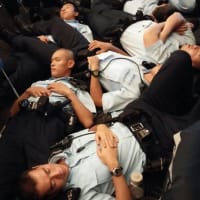
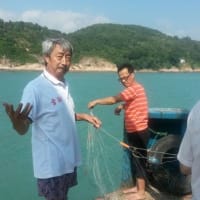

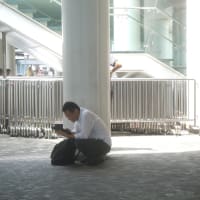
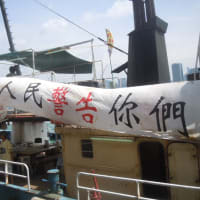
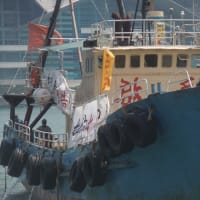
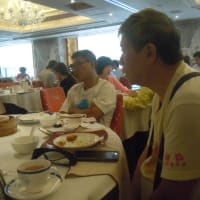
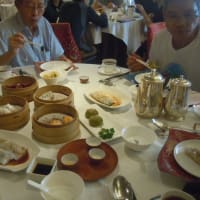
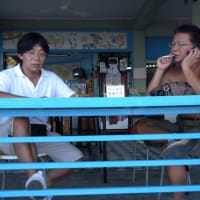
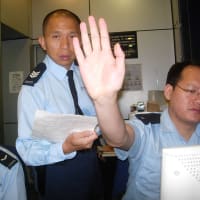
では。今年はこれで終わり。一覧も作らんかも。
---
検証・首相の靖国参拝 中国の意向に踊る? 山崎・自民幹事長、訪中で橋渡し役に
(産経 2001.08.15 朝刊)
田中真紀子外相がすったもんだの末、歴代四事務次官の更迭を受け入れ、首相官邸の喧噪(けんそう)が一息ついた八月三日夜。首相公邸に自民党の山崎拓幹事長が人目を避けるようにもぐりこんだ。
「臨時国会が終わった直後の十一日早朝にお参りするのが、一番いい。中国や韓国を本気で怒らせては構造改革どころではない」
山崎氏は「十五日」を外して中国、韓国の反発を和らげようという「ソフトランディング」案を初めて持ち出した。
首相はなお「八月十五日」にこだわったが、他の党三役や与党幹部の意見を「じっくりと聞く」と約束した。
◇
「きょう、あすは一切、取材に応じない。君らが書くと大変なことになるんや」
小泉純一郎首相が十日夜、与党三幹事長を首相公邸に招いて靖国問題について意見交換した直後、公明党の冬柴鉄三幹事長は、議員宿舎まで追いすがる記者団に言い放った。与党幹部は「山崎さんの態度で首相が十五日参拝を外すとの心証を得たのではないか」と振り返る。
ちょうど一カ月前の七月十日。与党三幹事長は北京の釣魚台で唐家[王旋]外相と向きあっていた。山崎氏は靖国参拝や教科書問題で批判が燃え盛っていた韓国、中国訪問にある決意を秘めていた。
山崎氏は小泉政権の弱点を(1)「抵抗勢力」の存在(2)景気の動向(3)外交-と分析。特に外交では「今、外務省がひどい。だれか中国や韓国に行かないことには靖国参拝の判断材料が全くない」と田中外相への懸念を漏らし、自らが「田中外交」の穴を埋めようと意欲満々だった。
一方で、橋本派の野中広務事務総長と連携を保ってきた冬柴氏とのきずなを深め、今後の政権取りに備えようという思惑もうかがえた。
「小泉首相はもはやYKK時代の政治家ではなく、その行動は国家意思の表明だ。三幹事長もその重みを認識してアドバイスしてほしい」
山崎氏の思惑を読んだ知日派の唐外相は、「YKK」の単語を持ち出して山崎氏の“プライド”を強く刺激した。
山崎氏は八月十一日夜には「YKK」のもう一人の「K」である加藤紘一元幹事長とともに首相公邸を訪ね、過激派の動向をも念頭に「不測の事態も起こりかねない」と再考を求めた。
すべてが終わった後、自民党の中堅議員は「中国の外交的勝利だ。山崎氏は中国側に手玉にとられた」とうめいた。
大体なんで訪中ん時だけ「極秘」呼ばわりされるんだか。鼻息アラいオッサン議員らが台湾行って、台湾でニュースに出てても日本のニュースに出ないじゃん。石原(父)が総統就任式でハラ壊した話とか(爆笑)
(South China Morning Post 2005.05.11)
MARK O'NEILL
While Japanese businesses bore the brunt of heated protests in China, business leaders such as Yotaro Kobayashi were also targeted in Japan for urging a conciliatory approach. Associated Press photo
A month ago, the largest retail chain in Hubei province announced that it was removing all Japanese products from its shelves and would not stock them until Tokyo failed in its bid to join the United Nations Security Council.
But now the story at Hubei Wushang Group, China's 18th-largest retailer, has changed. "We never stopped selling Japanese goods," said a manager at one of their electrical appliance stores. "If we did not offer Japanese brands, what would we sell? Recent sales have been good."
The past five weeks since protests began in cities across China have been a roller coaster ride for Japanese companies on the mainland. Tens of thousands of people joined marches calling for a boycott of Japanese products and the China Chain Store and Franchise Association told its members to stop selling goods made by nine companies it accused of supporting revisions of a controversial Japanese textbook.
Under intense central government pressure, the street protests have stopped, in part because of lobbying by the Japanese business community which is one of the main backers of Japan's ruling Liberal Democratic Party. The business lobby helped to persuade Japan's Prime Minister Junichiro Koizumi to issue an apology over war-time abuses to Asian and African leaders in Jakarta last month.
While no one knows the impact of the boycott, the more than 20,000 Japanese companies and the 9.2 million Chinese who work for them now have to live with the consequences of the campaign - on their sales; on the motivation of their employees; and on the reputation of their brands in one of the world's most competitive markets.
For a country with 15 years of negligible growth, the stakes could not be higher for Japan. Last year, China became Japan's largest export market, buying US$94.4 billion of goods, up 27.3 per cent from 2003.
China accounts for 15 per cent of global sales for Matsushita Electric, which plans to increase mainland sales to 70 billion yuan in 2006, from 40 billion yuan last year. Sony says that, by 2008, its sales in China will exceed those in Japan. Toyota says that it is only a matter of time before China becomes the world's biggest auto market, and the Japanese manufacturer aims to have 10 per cent of it.
Japanese firms are caught between a rock and a hard place. They face rising nationalism and long-standing resentment against their country in their fastest growing market, as well as the inability of their own government to establish a good relationship with Beijing.
"We have lived with this antagonism for a long time," said an official of a major Japanese firm. "It will continue. The impact is worse in the north and northeast. In Shanghai and coastal cities, people are more sophisticated and judge products on their merits."
Business leaders who try to play a role in the dispute run a serious risk. Yotaro Kobayashi, chairman of Fuji Xerox, which has three factories and a dozen branches in China, was bold enough to support Beijing's policy and call on Mr Koizumi not to visit the Yasukuni shrine, which honours Japanese war heroes.
For this, he received a bullet in the post from far-right groups, a box of Molotov cocktails were thrown at his house and trucks parked outside his home broadcasted loud nationalist messages for hours.
They gave the same treatment to another prominent business leader who made the same appeal - Yoshio Nakata, chairman of the Japan Association for the Promotion of International Trade, who has visited China 327 times since 1945 and studied in Beijing and Shanghai from 1953-1958.
"Japanese militarism not only led to the death of three million young Japanese soldiers, but a great catastrophe for Asia," said Mr Nakata. "Our prime minister should not visit Yasukuni. Japanese companies have acted, but not done enough. They should do something to break the deadlock."
At the 11th Shanghai International Auto Show late last month, Japanese managers did not want to speak about political issues. At its 19,000-sq ft booth, Nissan presented 14 vehicles, including its newest model, the Tiida. Officials said that they planned to double sales from 70,000 in 2003 to 140,000 this year, and to 300,000 in 2007.
"In the future, China will become our third-largest market after Japan and the US," said Katsumi Nakamura, president of Nissan's biggest joint venture in China.
But Nissan typifies the ambivalence of Japanese companies towards the China market. As early as the mid-1980s, its cars were among the most popular in China and the company was invited by the government to set up a manufacturing joint venture.
But it baulked. "If a plant in Europe or North America went badly, we could close it," said a Nissan official at that time. "But, if things went badly at a plant in China, we could not close it. There would be too much involved."
So it took a foreigner in the shape of Brazilian-Frenchman Carlos Ghosn, sent by Renault to head Nissan after its takeover, to make the decision to invest US$1 billion in China.
Nissan is one of dozens of companies who decided, after years of hesitation, that they had no alternative. Japanese firms have invested US$45 billion in China, including US$5.45 billion last year, when it accounted for more than 40 per cent of all Japanese investment in Asia.
But the historical resentment makes them the most vulnerable among foreign firms to consumer protest, with the media quick to seize on complaints about faulty products and turn them into a nationalist issue, accusing Japanese of discriminating against Chinese and selling poor-quality goods to them while reserving their best goods for Europe and North America.
In December 2003, for example, Toyota was forced to remove advertisements for two vehicles which some mainlanders found offensive. One showed a Prado GX passing a stone lion with its right paw raised, as if in salute. Some interpreted this as a Chinese symbol being forced to acknowledge a Japanese one and said it reminded them of the lions on Marco Polo bridge, where Japan launched an invasion of China in 1937.
Toyota protested that they were simply commercials, with no hidden meaning, but apologised and withdrew them. A similar commercial for a German or American vehicle would have attracted no such attention.
Other examples of sensitivity to Japanese products or services in 2001 included reports of defective brakes in the Pajero jeep produced by Mitsubishi Motors and complaints of bad treatment of Chinese passengers by Japan Airlines at Kansai International Airport.
"Previously, Japanese companies paid little attention to how to handle such crises in public relations," said Wang Zhile, director of China's centre for researching multinationals under the Ministry of Commerce. "Now they have started to train specialists in this and have become very careful in their marketing."
The lesson for Japanese firms is that, in China, they must treat product quality, marketing and public relations with the same care and detail as they do in countries in the west with strong consumer groups and a love of litigation.
Another long-term impact of the protests is on recruitment. When a team from Toyota went to recruit graduates at one Chinese university late last year, it found fewer applications than it expected for one of the world's most famous companies. Instead of inquiring about salaries and conditions, students wanted to talk about bilateral relations and if they would receive unfair treatment. For a short time, the situation was out of control, before teachers and university staff restored order.
A study, published in March, of employment in Japanese companies compared with European/American companies, found that Japanese firms paid less and offered less promotions to Chinese, but offered more stability, with the likelihood of dismissal being less than half.
"Japanese investment in east China is centred on manufacturing electronics and machinery and using the region as a manufacturing base," said Li Shuang, of Shanghai Jiaotong University, and one of the authors of the study.
"Many companies have not set up design and research departments, but European and North American companies go for a higher grade of staff and are looking for senior managers on high salaries."